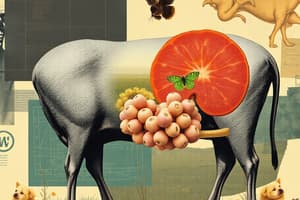Podcast
Questions and Answers
What percentage of their energy may advanced fishes use to extract oxygen from water?
What percentage of their energy may advanced fishes use to extract oxygen from water?
- 5%
- 20% (correct)
- 30%
- 10%
Why must respiratory surfaces remain moist?
Why must respiratory surfaces remain moist?
- To maintain a stable temperature.
- To prevent the invasion of pathogens.
- To allow diffusion of gases. (correct)
- To facilitate nutrient absorption.
Which of the following respiratory systems is characteristic of insects?
Which of the following respiratory systems is characteristic of insects?
- Tracheal system (correct)
- Lungs
- Gills
- Branchial pump
What method do fish gills use to maximize oxygen extraction?
What method do fish gills use to maximize oxygen extraction?
Which respiratory structure is considered the least efficient in invertebrates?
Which respiratory structure is considered the least efficient in invertebrates?
What role does insect blood play in respiration?
What role does insect blood play in respiration?
Which of the following organisms primarily utilizes invaginations for breathing?
Which of the following organisms primarily utilizes invaginations for breathing?
What is the primary function of spiracles in the tracheal system of insects?
What is the primary function of spiracles in the tracheal system of insects?
Which gas has the greatest effect on respiratory rate?
Which gas has the greatest effect on respiratory rate?
What is the most widespread respiratory pigment in vertebrates?
What is the most widespread respiratory pigment in vertebrates?
What is the role of haemoglobin in the body?
What is the role of haemoglobin in the body?
How do invertebrates primarily transport respiratory gases?
How do invertebrates primarily transport respiratory gases?
What must organic compounds undergo before animals can absorb them?
What must organic compounds undergo before animals can absorb them?
What process allows animals to obtain energy from food?
What process allows animals to obtain energy from food?
Which pigment is found in crustaceans and serves a similar function to haemoglobin?
Which pigment is found in crustaceans and serves a similar function to haemoglobin?
What happens to food not immediately used by the body?
What happens to food not immediately used by the body?
What proportion of the dry weight of faeces in adults is made up of bacteria?
What proportion of the dry weight of faeces in adults is made up of bacteria?
Which vitamin is synthesized by bacteria found in faeces?
Which vitamin is synthesized by bacteria found in faeces?
What is the primary factor in determining whether a parasite can survive in its host?
What is the primary factor in determining whether a parasite can survive in its host?
What term describes an animal's inability to eliminate a parasite before it becomes established?
What term describes an animal's inability to eliminate a parasite before it becomes established?
Which type of immunity does not depend on prior exposure to an invader?
Which type of immunity does not depend on prior exposure to an invader?
What type of barriers does the integument provide against invading organisms?
What type of barriers does the integument provide against invading organisms?
What happens to some parasites after a host recovers clinically?
What happens to some parasites after a host recovers clinically?
What can be found in the secretions of the alimentary tract that acts as a chemical defense?
What can be found in the secretions of the alimentary tract that acts as a chemical defense?
What role does the pyloric sphincter play in digestion?
What role does the pyloric sphincter play in digestion?
How does the structure of the intestine facilitate absorption in vertebrates?
How does the structure of the intestine facilitate absorption in vertebrates?
In which type of animal might the intestine primarily function as a pathway for waste?
In which type of animal might the intestine primarily function as a pathway for waste?
What feature is common in the intestines of mammals?
What feature is common in the intestines of mammals?
Which of the following components significantly increases the surface area of the intestinal cavity?
Which of the following components significantly increases the surface area of the intestinal cavity?
What process occurs primarily in the large intestine?
What process occurs primarily in the large intestine?
In which animals is the reabsorption of water particularly crucial due to their living conditions?
In which animals is the reabsorption of water particularly crucial due to their living conditions?
What type of feces do reptiles and birds generally produce?
What type of feces do reptiles and birds generally produce?
What is the primary function of grinding and cutting mandibles in locusts?
What is the primary function of grinding and cutting mandibles in locusts?
What adaptation allows herbivores to digest food that carnivores cannot?
What adaptation allows herbivores to digest food that carnivores cannot?
What is a characteristic of fluid feeding in parasites?
What is a characteristic of fluid feeding in parasites?
In which organisms does intracellular digestion primarily occur?
In which organisms does intracellular digestion primarily occur?
What is one major limitation of intracellular digestion?
What is one major limitation of intracellular digestion?
What defines extracellular digestion in animals?
What defines extracellular digestion in animals?
How are the metazoan alimentary canals structured?
How are the metazoan alimentary canals structured?
What role does the lumen of alimentary canals play in digestion?
What role does the lumen of alimentary canals play in digestion?
Flashcards are hidden until you start studying
Study Notes
Energy Costs in Respiration
- Advanced fishes expend up to 20% of their energy on oxygen extraction from water.
- Mammals have a significantly lower respiration energy cost, utilizing only 1% to 2% of their resting metabolism.
Structure of Respiratory Surfaces
- Respiratory surfaces need to be thin and moist to facilitate gas diffusion.
- Air breathers typically have invaginations (lungs, tracheae) for air intake, while aquatic creatures have evaginations (gills) suitable for extracting oxygen from water.
Tracheal System in Invertebrates
- Insects, centipedes, millipedes, and some spiders possess a tracheal respiratory system that is efficient and direct.
- Tracheae are branching tubes reaching all body parts, with tracheoles terminating at cell membranes for gas exchange.
- Air enters through spiracles and bypasses the circulatory system in respiration; insect blood does not transport oxygen.
Function and Structure of Gills
- Gills serve as effective respiratory systems for aquatic life, with internal gills being the most efficient.
- Fish gills feature thin filamentous structures that allow for countercurrent flow, maximizing oxygen extraction.
- Water moved over the gills by an efficient pumping mechanism facilitates continuous gas exchange.
Lung Structures in Invertebrates
- Some invertebrates, like pulmonate snails and certain crustaceans, possess rudimentary lungs with less efficient ventilation compared to vertebrates.
- Ventilated lungs in terrestrial vertebrates enable rhythmic air exchange.
Respiratory Gases and Pigments
- Low water solubility of oxygen limits gas transport in some invertebrates, necessitating respiratory pigments for efficient oxygen transport.
- Haemoglobin is the most widespread respiratory pigment in vertebrates, allowing oxygen binding and release based on prevailing oxygen concentrations.
- Invertebrate pigments include hemocyanin and chlorocruorin, differing in composition and function.
Overview of Digestion
- All organisms derive energy from transforming complex external compounds into simpler forms, primarily from sunlight captured by plants.
- Animals are heterotrophic, relying on digestion to convert food into absorbable units.
Mechanisms of Digestion
- Digestion involves mechanical and chemical breakdown of food, transforming large particles into soluble molecules for absorption into the circulatory system.
- Herbivores possess specialized teeth (e.g., grinding molars) to disrupt tough plant materials, aided by intestinal microorganisms for digestion.
Types of Digestion
- Digestion can be intracellular (within cells) or extracellular (in an alimentary canal).
- Extracellular digestion allows for processing larger food masses and involves specialized cells for secretion and absorption.
Structure of the Alimentary Canal
- The alimentary canal has five main regions facilitating digestion: reception, conduction/storage, grinding/early digestion, terminal digestion/absorption, and water absorption/concentration of solids.
- In vertebrates, the intestine features adaptations like folding and villi that greatly enhance surface area for absorption.
Role of the Large Intestine
- The large intestine reabsorbs water to form solid or semisolid feces, crucial for waste elimination.
- Invertebrates often rely on diverticula for extensive processing, while vertebrates utilize the intestine for both digestion and nutrient absorption.
Microbiota in Digestion
- The human colon houses significant microbial populations, contributing to waste degradation and nutrient synthesis, notably vitamins.
Summary of Immune Function
- The immune system is vital for animal survival, protecting against a wide array of potential parasites and pathogens in the environment.
- Resistance to parasites is influenced by both innate and acquired immunity; innate immunity offers immediate, nonspecific defense, while acquired immunity develops specific responses over time.
Defense Mechanisms
- Physical barriers, like the integument, along with antimicrobial substances in body secretions, enhance defense against pathogen invasion.
- Chemical defenses include acidic environments in body cavities and digestive tracts, further preventing infection.
Studying That Suits You
Use AI to generate personalized quizzes and flashcards to suit your learning preferences.




